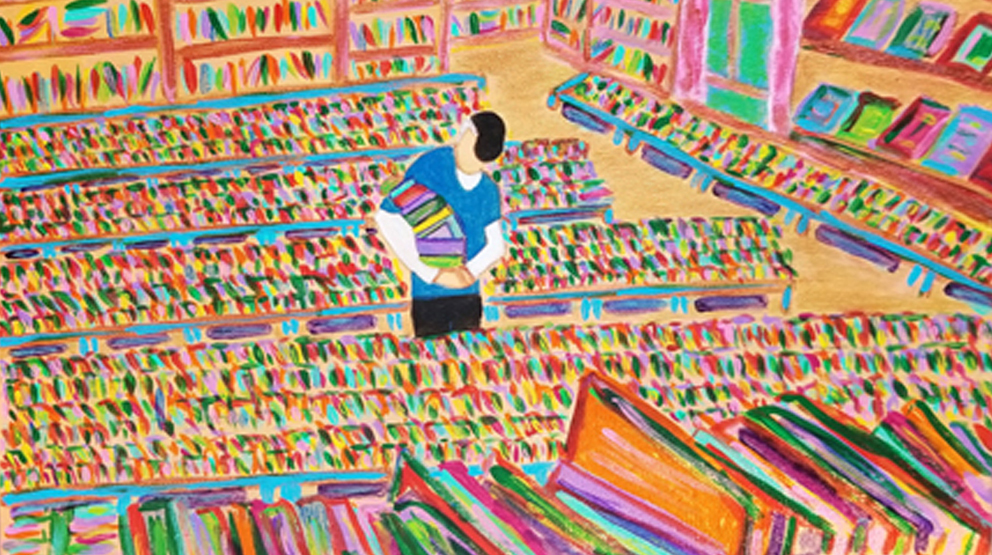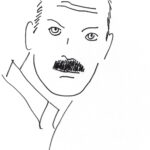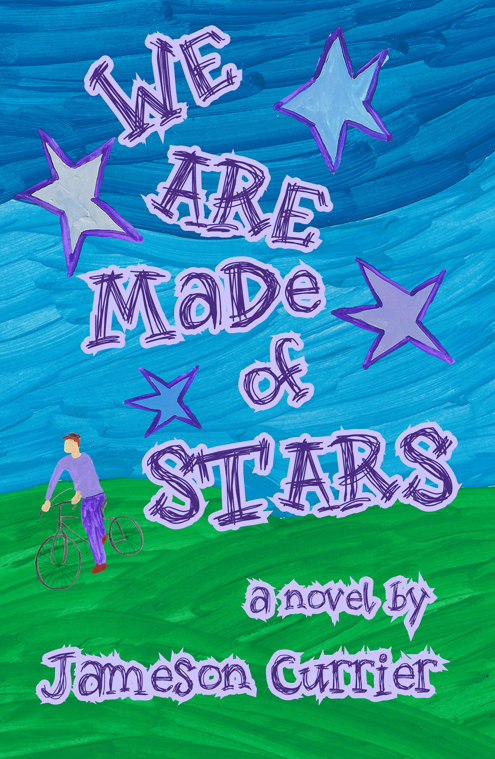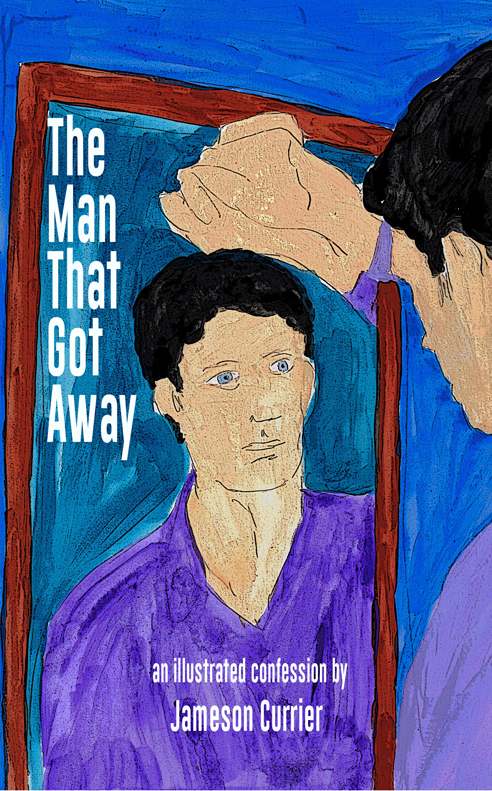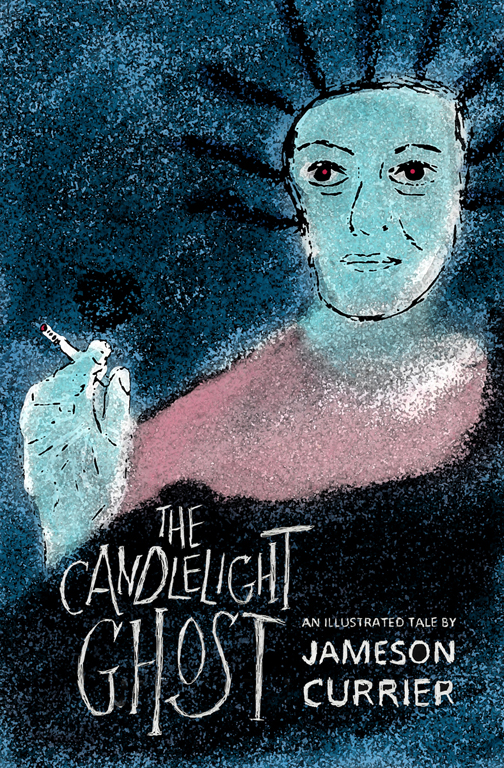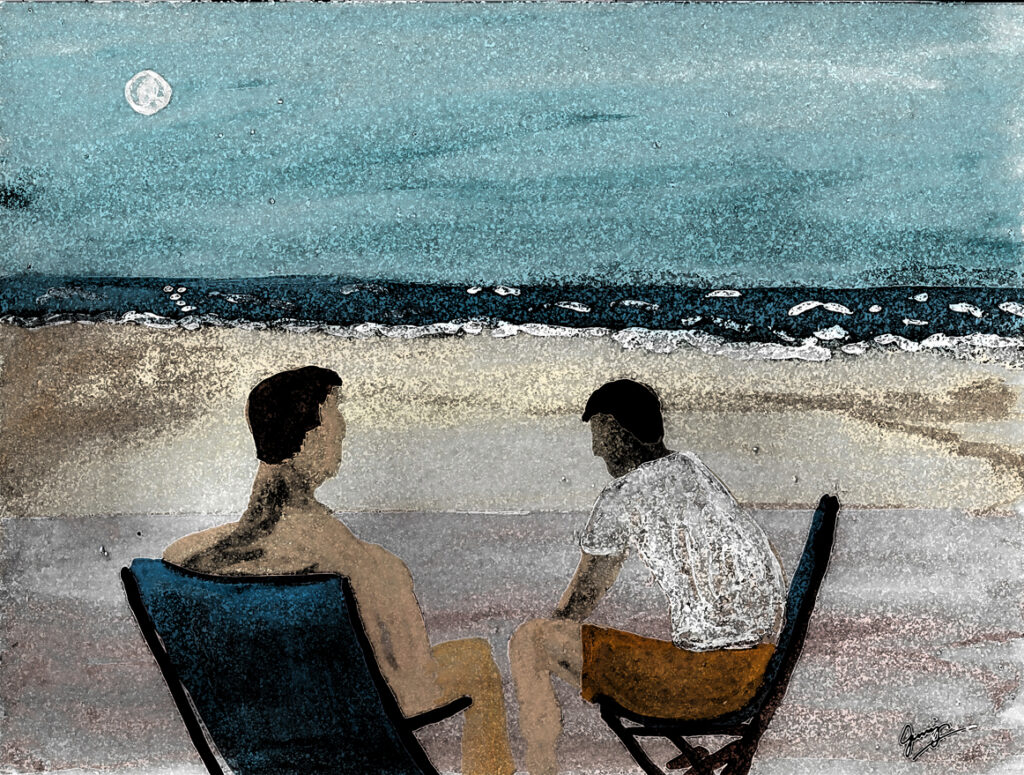
illustration by Jameson Currier
DANCING ON THE MOON
by Jameson Currier
Music bled through the walls like an amplified heartbeat. Eddie was outside, on the deck of the Pavilion, the palms of his hands flat against the wood railing as he leaned into the warm summer night. He rocked lightly back and forth on the heels of his feet, trying to bridge the sounds of a syncopated drum to the constant whispering rhythm of the Atlantic waves. He stopped when he noticed Bill was beside him, his figure eclipsing a portion of the full moon.
“I thought you wanted to stay,” Eddie said, and felt a breeze rise and slip between them.
“Not really,” Bill answered, and ran his hand through his hair, fingering the blond strands which the wind had blown across his eyes.
Bill turned and Eddie followed, weaving through a group of brightly dressed men. A flash of blue light blinked through the door of the disco as Eddie passed by, making his white cotton shirt glow as though he had slipped in front of an ultraviolet beam. In the darkness of the stairway, Eddie lost sight of Bill, and he hurried down the stairs two steps at a time. On the boardwalk, he quickened his pace, conscious of the way the planks of wood shifted beneath his feet and added a bounce to his steps. It gave him an odd feeling, he thought, part delight, part discontent, like a young boy dragging a balloon home before the circus had left town.
“Let’s take the beach back,” Eddie said when he had caught up with Bill.
Bill nodded and shoved his hands into the pockets of his jeans.
At the intersection of two lanes they drifted to the left, traveling between houses perched on stilts above the sand. The boardwalk dipped and climbed a dune. Eddie’s heart jumped as the ocean came into view and the moon slid across the top of the water. Bill said nothing but bent his head toward Eddie, as though waiting for him to speak. Eddie remained silent but shifted his shoulders slightly, continuing his pace and staring straight ahead.
Eddie had thought about the beach all week; in August the city was muggy and oppressive. He could never reach work without becoming drenched in sweat, and the drone of the air conditioner in his office sent him home with headaches. Bill had hesitated about leaving the city, but Eddie explained there would be plenty of distractions: they could spend the afternoon on the beach or take a walk to the Grove, in the evening there was Tom and Allan’s party, and afterward, if they didn’t want to go dancing, they could always stay in and watch a movie. On the ferry across the bay Eddie carried a bag of books he had bought the night before, when he had wondered what they should do if it rained. Bill held another bag, which contained boxes of games: Monopoly, Scrabble, and Trivial Pursuit.
Eddie stumbled on a board and stopped, momentarily confused by the way the moonlight brightened some planks and left others gray or completely lost in shadows. Bill paused in front of him. The moon was straight ahead. It reminded Eddie of a volleyball, and all he had to do was play the game. Push the ball over the net. Bill would turn around and hit it back into the air.
That’s what they had done at the beach today. They had played the games. Not just volleyball and Frisbee, but also the game of observation, a game that demanded little concentration, just a pair of roving eyes to watch the parade of men in front of the water. The ocean was as still as a pond, the surf only a few inches high, and beneath a cloudless, Crayola-blue sky the sand was covered with bodies, stripped and simmering under the sun. This was why they came here every summer, Eddie told himself when he lay on an oversized towel, the smells of suntan lotion, salt water, and sweat rippling together in the air above him. On the radio Eddie had heard that tomorrow the weather would be just as wonderful. He was glad. It seemed to infuse everyone with a tranquil energy, suspending for a while any pressure or trouble.
When the boardwalk ended, Eddie sat on the top step and unlaced his sneakers, noticing the way the moonlight magically made the dark hair on his arm seem blond. Bill stood on one leg and then on the other, leaning and pulling his shoes off with ease, then tying the laces together through a belt loop of his jeans so that the shoes dangled freely just below his hip.
On the beach the sand felt surprisingly chilly, and Eddie squeezed and curled his toes for warmth as he walked. Carrying a sneaker in the palm of each hand, he outspread his arms and waved them from side to side as though treading a tightrope. Finally, he felt released from the anxiety he had carried all day. This summer, with Mike’s absence, Eddie felt the need to have plans. Mike had always made the summers seem spontaneous, collecting invitations to parties the way a child gathered sea shells. Earlier this evening, Eddie and Bill had gone to Tom and Allan’s party. Eddie knew it wouldn’t be the type of party Bill used to work at as a bartender in the city. It wouldn’t be like the legendary Fire Island parties either, the ones with suggestions to come in red, come in white, or maybe leather. There wouldn’t be any bartenders or costumes at this party. Tom and Allan had just returned from Paris, and the party was planned as a simple dinner for friends.
Eddie had been concerned that the party might be uncomfortable for everyone. Tom and Allan had not been at the beach this afternoon. Before they left two weeks ago for Paris, Allan had noticed a small spot on his neck and a doctor had diagnosed it as Kaposi’s sarcoma. It seemed an awkward time to give a party, though Eddie was grateful for the opportunity to be together. It gave them something to do, a place to be, a chance to lend each other support in a subtle, unspoken way. Tom and Allan had decorated their house with paper lanterns and jasmine-scented candles, and served pasta with artichokes, grilled swordfish, and a frozen cappuccino soufflé to twelve friends. Bill showed Tom how to make blue margaritas, and Allan passed around photos he had taken from the top of the Eiffel Tower. Eddie tried to stay in constant motion, circulating through the room with napkins, plates, and buckets of ice, aware that Bill was scrutinizing his every move. During dinner, Allan said Paris was as romantic as he had envisioned: the cafés, the museums, especially the boat ride along the Seine. Eddie decided the party must have been Tom’s suggestion, just as the impromptu trip to Paris had been.
Afterward, while Eddie was helping Allan wash the dishes in the kitchen and Bill and Tom were cleaning the living room, a song came on a tape Tom had made three years ago. It was the Supremes singing “Where Did Our Love Go?” Eddie became nervous and walked to the door that separated the rooms. Tom seemed frozen to the floor, unable to move, but when Bill started rocking his legs back and forth in time to the music, Tom relaxed and joined in. Watching them made Eddie achingly miss Mike. Mike would have stopped everything, walked to the center of the room, and matched his lips to Diana’s voice, swinging his arms in all directions as if he had actually practiced the choreography. It was Mike who had said Allan would settle down. Eventually. We all went through that stage. But it was Eddie who had suffered through Allan’s turbulent period. Allan got hooked on coke and started tricking with guys for money. Eddie often wondered if he had ever really had a relationship with Allan, or had it been just an affair that lasted too long? It was ironic, Eddie thought, that it was Allan who had kept the relationship going with Tom for over three years while Eddie had passed through a succession of beds.
Eddie stared at the moon, half expecting it to suddenly spin and twirl in the sky like a spotlight in a disco. He paused and asked Bill how he thought Tom and Allan had looked tonight. “All right,” Bill said, easing onto the strip of hard, wet sand. Eddie made a series of large, brisk strides until he was once again beside Bill. Eddie thought Allan had looked great; the face that had intrigued a city of men seemed untouched. It was Tom who looked tired and troubled.
Even if Bill had detected a change, Eddie knew Bill would not acknowledge it. It was what he had done with Mike. Eddie had never seen Bill cry about Mike, though he knew Bill was not cold and indifferent. Some people reacted differently, even if it was a refusal to react at all. Eddie had always felt Bill held too much inside; now, at the slightest hint of sympathy, Bill would tense and walk away. Eddie believed Bill felt responsible for Mike’s death. Bill had slept with other men. But so had Mike. Eddie remembered Bill at the hospital, struggling to lift Mike’s spirits, hoping to squeeze a laugh out of him by doing something silly, like pinning flowers and fruit to a towel and wrapping it around his head, dancing about the room like Carmen Miranda, never once admitting the possibility of death. When Mike died, Bill was leaning against the edge of the hospital bed, drawing a clown’s face on a white sock. Eddie had sat staring at an arrangement of daisies, trying to contain his horror.
Bill stopped and stretched, pressing his hands against his lower back and arching his chest toward the sky, a habit Eddie had noticed Bill had started, to release the stress. The sound of laughter floated from the direction of a house and Eddie turned and glimpsed two figures emerge through a door, their T-shirts and sneakers disappearing quickly into the night. The tragic mistake, Eddie decided, was that a stranger would still question their lives. Why were they still giving parties? Why were they still dancing? Wouldn’t fear make them reclusive? Eddie would answer that they wanted to be together. They had to be together. And though the wild, campy times had become wary and reserved, Eddie was thankful just to be alive and worried. Bill cut across the sand toward a path through the dunes. Before they reached the house, Eddie asked Bill if Tom had hinted whether Allan had started treatments. “No,” Bill answered. “And I didn’t want to ask.”
* * *
Mike had been adamant about the beauty of certain things: the symmetry of a physique, the color of a cocktail, the way the summer sun, setting, polished the landscape with amber. Every summer, Mike had led them to tea dance at the bar in the harbor, where beauty assembled its pieces together into a late-afternoon puzzle. This afternoon, there were faces Eddie had never seen in the ten years he had been coming to the Pines, but that wasn’t what pleased him. It was the ones that had returned. Eddie was relieved to recognize a familiar face. Eddie and Bill had lingered longer than they had anticipated, talking with Wayne, a friend of Eddie’s from his first summer on Fire Island, who had traveled all the way from Minnesota just to spend the weekend.
“This is what I remember most,” Wayne had said, and lifted his drink as though proclaiming a toast. “All the beautiful boys with reflections in their eyes.”
“It must be tough to be young and pretty today,” Eddie said.
“Look but don’t touch,” Wayne added.
“Touch but don’t feel,” Bill said.
“We were like that,” Wayne said.
“Tough? Young? Or pretty?” Bill asked.
“All of the above,” Wayne answered.
“Is it harder for them or harder for us?” Eddie questioned.
“Look at that one,” Wayne said, tipping his chin toward a young man wearing a tank top.
Eddie turned and studied the dark, exotic youth. Years ago, Mike would have leaned close to Eddie and whispered some piece of gossip, something like, “He was the one last night in nothing but feathers,” or, “I heard be spent the entire afternoon in the dunes.” Those first summers, Eddie had been obsessed with sex. He had had sex on the beach, beside pools, and underneath the moon. Sex before parties, after dancing, between sheets sprinkled with fine grains of sand. Was what he had done, he thought now, more reckless than what two teenagers did on a dark suburban street in the back seat of a car?
Eddie glanced around the room of men, suddenly aware of how time had passed. Should he feel guilty today about a virus that years ago he hadn’t known to exist? Had his terror created an absurd game of guessing: who has it, who doesn’t, which one of us is going to go next?
Wayne nudged Eddie in the side as the dark young man moved to another spot. “Do you realize,” Wayne said when the youth had disappeared, “you’ve probably already had him? If you slept with one of us, you’ve slept with all of us.”
* * *
Bill and Mike and Tom and Allan were Eddie’s closest friends. At some point, for some time, if only just a night, each of them had been his lover. It was sex that had introduced them and kept them together. Eddie and Mike had been best friends since college. Together, they had owned a graphic-design company in Greenwich Village. Eddie and Tom had met at a gym in Chelsea, but it was Mike who had introduced Eddie to Allan in the lobby of the Met. Eddie, in turn, had introduced Allan to Tom. Eddie and Bill had met at a party where Bill was a bartender. Mike had met Bill when he went to a bar with Eddie. Bill and Mike had been lovers for seven years. Sometimes Bill said it was Eddie who had kept Bill and Mike together for so long. Eddie had not only solved every business crisis but had exposed the frustrations of one-night stands. It angered Eddie that Bill might think that way, as though Eddie’s success in business and casualness with lovers had produced a life less fulfilling than Bill’s. Or was it that Bill felt it should have been Eddie who was sick, that the wrong person had grabbed a seat in a bizarre round of musical chairs? Certainly Bill must realize that no one understood exactly what was happening. One unexpected death did not diminish the probability of another. Wayne had even mentioned this afternoon that there was still the likelihood that any of them could develop a regular disease, something like diabetes or meningitis.
“Okay?” Bill asked. They were back at the house.
Eddie nodded. He was standing at the glass doors which led to a deck and the beach and the black waves lapping ashore. In the reflections of the glass Eddie thought his eyes looked puffy and dull, as though he had drank too much or had taken too many drugs. Eddie felt the pressure of perspiration thickening the pores of his brow. This wasn’t the way it was supposed to happen. In spite of their perplexing behavior, or, maybe, because of it, Eddie knew he and Bill had fallen in love. But it was impossible to remove Mike from the picture. Afraid of crying, Eddie walked toward the kitchen without saying a word.
Lately, when Eddie was depressed, Bill had been unable to provide the humor he had administered to Mike. All Bill could offer, Eddie knew, was his refusal to leave Eddie alone. Bill would follow Eddie, watching every move, waiting for the anguish to erupt. Sometimes Eddie felt Bill wanted him to cry—that his display of emotion would preclude any from Bill. Yet, if Eddie tried to touch or comfort Bill, Bill would back away, shake his head, or leave the room. The aftershock of Mike’s death had produced a curious alliance between them. In the last two weeks, Bill had moved into Eddie’s apartment in the city and Eddie had sold the business and started a new job uptown at an advertising firm. Now Eddie had learned to accept Bill’s presence as if he were a shadow. But he was also aware that Bill was afraid of being alone.
Eddie drank a glass of water in front of the kitchen sink, and then, impulsively, slipped his head beneath the faucet of cold water. He shivered and grabbed a dish towel and dried his face and hair. Walking into the hall, he imagined a breeze wandering through the house like a ghost, even before he discovered the glass doors were open.
Bill was outside, on the deck, in one of the canvas chairs, reclined as though he were trying to darken his tan. He had undressed to his underwear. His eyes were closed. Eddie thought about placing his hands on Bill’s shoulders, gently massaging the sleep away. But Eddie was still uncertain Bill would allow even such a simple touch. It was odd, Eddie knew, how much they needed each other, how much they cared, deeply, for one another, yet, since Mike’s funeral seven months ago, nothing physical between them had transpired. Eddie went inside and found a large red beach towel and went back outside and draped it over Bill. He sat on the top step that led to the beach and pulled his legs up against his chest, clasping his arms around them and rocking his body slowly back and forth.
This afternoon, on the beach, Eddie had been startled by a woman standing in front of him. She wore a floppy wide-brimmed hat and a baggy, pale-blue sundress, and as she spread her legs apart on the sand and crouched, the hem of her dress dangled beneath her ankles, blackening as it began to soak up water. She raised a camera to her face and leaned toward the ocean. Bill had been swimming and was approaching in her direction, his long, firm legs leaving behind a trail of salty white foam. Bill lifted his hands to his forehead and pushed the wet hair away from his eyes, unaware of the woman focusing on him. Eddie had wondered what the woman hoped to capture. Was it the way Bill’s body, sturdy and defined as a gymnast’s, glistened with water as though painted with oil? Or was it the way he moved, graceful and calm, nothing to indicate that the slightest movement could be too painful to perform?
The waves continued, rising and falling like sleeping breaths. The evening air flapped through Eddie’s shirt. Eddie doubted the weather tomorrow could be the same. Nothing is ever the same, he decided. Every wave moved closer or farther than the one before. He was thirty-six years old and had not had sex in over a year. Yet it was still hard for him to believe this was the summer of 1985 and four friends were already dead, another was in the hospital, and three more had been diagnosed. When would this nightmare end?
Eddie tilted his head toward the moon. Would a stranger confuse Bill’s repose and Eddie’s rocking for exhaustion and intemperance? The consequence and reparation of lives too extreme? Would a stranger understand their lives, or were they still full of misconceptions? Having been there, having seen them at the bars, the gyms, the baths, the discos, the beaches, would a stranger understand the unbearable sorrow which had punctured their souls so profoundly it was now granted the same recognition as the sound of waves crashing against the sand? Wayne had mentioned at tea dance that life in Minnesota still seemed mild compared with all this activity. “No one out there has a clue as to what our lives are like,” he said to Eddie. “They think we haven’t changed a bit. All this is as strange to them as dancing on the moon.”
A young man strolling home alone on the beach as the sun is beginning to rise, the music from the Pavilion still pulsing in his blood, would notice Eddie and Bill on the deck. The young man would not wonder. He would know. These were not giant leaps but cautious steps, one foot carefully placed in front of the other.
__________
“Dancing on the Moon” first appeared in the author’s collection Dancing on the Moon: Short Stories About AIDS, published in hardcover by Viking in 1993 and in paperback by Penguin in 1994, and Still Dancing: New and Selected Stories, published in paperback by Lethe Press in 2008.
